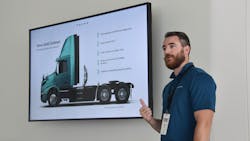For those skeptical of EVs, Volvo offers ‘electromobility ecosystem’
DUBLIN, Virginia—The subtext of a daylong summit with Volvo Trucks North America personnel was unmistakable for trucking-industry media who gathered here on Sept. 29 at the Volvo Customer Center: How do OEMs convince skeptical fleet owners that electric Class 8s could be the answer to their multimillion-dollar investment in sustainability but who worry about their return on that investment?
“ROI is not the first question we receive from our customers. The first one is how I can put electric trucks on the road,” VTNA's president, Peter Voorhoeve, told FleetOwner editors and other media gathered for Volvo's Electromobility Sales Summit, which also included ride-and-drives of the OEM’s Class 8 all-electric, the VNR Electric, on the company’s test track adjacent to its 1.6-million-square-foot New River Valley assembly plant.
See also: Volvo to sell VNR Electric chargers directly to customers
Volvo’s answer is to surround its customers with and sell prospective customers on what this OEM calls its “electromobility ecosystem”—several configurations of the VNR Electric (4x2 straight truck, 6x4 straight truck, 4x2 tractor, 6x2 tractor, or 6x4 tractor), charging and infrastructure, insurance, service and repair at EV-certified dealerships, and “connected services” that generate performance data on range, capacity, and route optimization to use the least amount of onboard energy.
In remarks before the assembled media and in his chat with FleetOwner, Voorhoeve was bullish on Volvo’s ability to “create the demand” by answering the industry’s top concerns surrounding any electric vehicle: range, batteries, and available charging. He noted that Volvo’s strategy, its “ecosystem,” consists of 25% truck and 75% “stuff around the truck.”
“Charging infrastructure will increase demand for battery-electric vehicles, but we’re not going to wait for that,” he added. “We’re going to create the demand.”
Volvo officials lead with Gold Contract
VTNA representatives spent much of the electromobility summit covering the company’s Gold Contract, a turnkey solution that allows customers to have operational peace of mind with electric vehicles.
The Volvo Gold Contract also includes the full Uptime Services bundle from Volvo Trucks, which has been enhanced for the Volvo VNR Electric to include a new battery monitoring service that further supports customer uptime and peak operating conditions. Customers also receive Volvo’s Remote Diagnostics, Volvo Action Service, and ASIST via the Volvo Trucks Uptime Center, which offers 24/7 customer support, according to the company.
VFS also offers financing and leasing options for the new Volvo VNR Electric model and, for the first time, is offering financing solutions for the charging stations needed to support the trucks. Customers are required to purchase the Gold Contract if they want to purchase or lease a VNR Electric, VTNA officials said.
Certified EV dealerships growing to 55
“This takes key stakeholders all moving in the same direction,” Voorhoeve at the summit’s outset.
One of those cogs in Volvo’s effort is its EV-certified dealerships, which Voorhoeve noted in his presentation will expand from the current 18 in California, Florida, Idaho, Massachusetts, Minnesota, New York, New Jersey, Pennsylvania, Tennessee, Texas, Virginia, and north of the border in Canada more than twofold to a total of 55. The latest dealership was Nuss Truck & Equipment in Roseville, Minnesota, VTNA announced the day before the summit on Sept. 28.
The next dealerships will be two in California, a first in Oregon, three more in Canada, one in Colorado, another in Florida, two in North Carolina, one in Montana, another in Minnesota, one each in Iowa and Oklahoma, two more in Texas, two in Wisconsin, one in Indiana, two in Kentucky, two dealerships in Ohio, two in North Carolina, and six others in the Northeast between Delaware and New York state.
See also: The dawn of hydrogen trucks
In his opening presentation, Voorhoeve noted that the expanding roster of certified EV dealerships brings attention to Volvo's sustainability efforts and draws customers' focus on the company as a whole. He added that VTNA had grown its market share through the two-year period of COVID-19 with all of its vehicles, including its diesel-burning ones, from 9.7% in 2019 to 10.4% through the worker strike at New River Valley in 2021 and now up to 11.3%, U.S. and Canada combined.
“People find our focus on sustainability good, it gets their attention,” Voorhoeve said. “It’s the difference between selling trucks and driving prosperity.”
Though, he said, the company’s roadmap—its “three parallel roads”—still firmly includes trucks with internal combustion engines, it’s all-in with battery-electric commercial vehicles, VNR Electric being the first, and fuel-cell trucks that burn hydrogen and convert it to electricity for power.
And he conceded that electric trucks can’t right now meet the need for long-haul trucking—“I don’t think we will see many battery-electric vehicles driving from Chicago to L.A.”—though vehicles like the VNR Electric can have a firm foothold in local and regional operations.
Voorhoeve noted that local suppliers and carriers use the VNR Electric to deliver parts and components to the New River Valley assembly plant and to its Hagerstown, Maryland, powertrain manufacturing facility. There also have been notable regional applications (the “R” in VNR stands for “regional”) for the electric truck in the New York City area and in California’s Inland Empire near the Ports of Los Angeles and Long Beach, with deployment among several companies and trials of the electric truck as part of the truck-as-a-service (TaaS) model. In August, the OEM also concluded its LIGHTS project in California South Coast Air Basin that seeded VNR Electrics to fleet operators to collect real-world operating data and gain customer feedback ahead of its production.
About the Author
Scott Achelpohl
Managing Editor
Scott Achelpohl is a former FleetOwner managing editor who wrote for the publication from 2021 to 2023. Since 2023, he has served as managing editor of Endeavor Business Media's Smart Industry, a FleetOwner affiliate.

